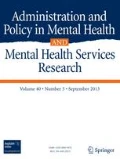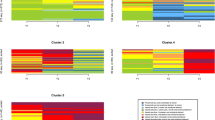Abstract
Although sustainability is frequently described as a project goal in community-based programs, concentrated efforts to sustain interventions beyond the conclusion of research funding have only recently emerged as a focus of implementation research. The current paper describes a study of behavioral consultation to after-school program staff in low-SES, urban communities. Following consultation, staff use of four recommended tools and strategies was examined, emphasizing facilitators and barriers to sustainability. Results indicated high perceived utility and intention to use intervention components, but low sustainability at two follow-up time points within 1 year after the initial consultation concluded. Findings suggest that ongoing implementation support in community settings may be necessary to ensure the sustainability of interventions and meet the mental health needs of participating high-risk youth.



Similar content being viewed by others
References
Aday, L. A. (1994). Health status of vulnerable populations. Annual Review of Public Health, 15, 487–509.
Atkins, M. S., Frazier, S. L., Birman, D., Adil, J. A., Jackson, M., Graczyk, P. A., et al. (2006). School-based mental health services for children living in high poverty urban communities. Administration and Policy in Mental Health and Mental Health Services Research, 33, 146–159.
Atkins, M. S., Graczyk, P. A., Frazier, S. L., & Abduil-Adil, J. (2003). Toward a new model for promoting urban children’s mental health: Accessible, effective, and sustainable school-based mental health services. School Psychology Review, 12, 503–514.
August, G. J., Bloomquist, M. L., Lee, S. S., Realmuto, G. M., & Hektner, J. M. (2006). Can evidence-based prevention programs be sustained in community practice settings? The Early Risers’ advanced-stage effectiveness trial. Prevention Science, 7, 151–165.
Barrish, H. H., Saunders, M., & Wolf, M. M. (1969). Good Behavior Game: Effects of individual contingencies for group consequences on disruptive behavior in a classroom. Journal of Applied Behavior Analysis, 2, 119–124.
Bureau of Justice Statistics. (1997). Age patterns of victims of serious violent crime (NCJ-162031). Washington DC: US Department of Justice.
Cutler, I. (2002). End games: The challenge of sustainability. Baltimore: Annie E. Casey Foundation.
Durlak, J. A. (1997). Successful prevention programs for children and adolescents. New York: Plenum.
Embry, D. D. (2002). The Good Behavior Game: A best practice candidate as a universal behavioral vaccine. Clinical Child and Family Psychology Review, 5, 273–297.
Fixsen, D. L., Naoom, S. F., Blase, K. A., Friedman, R. M., & Wallace, F. (2005). Implementation research: A synthesis of the literature. Tampa: University of South Florida, Louis de la Parte Florida Mental Health Institute, The National Implementation Research Network.
Frazier, S. L., Chacko, A., Van Gessel, C., O’Boyle, C., & Pelham, W. E. (in press). The summer treatment program meets the south side of Chicago: Bridging science and service in urban after-school programs. Child and Adolescent Mental Health.
Frazier, S. L., Mehta, T. G., Atkins, M. S., & Hur, K. (under review). Not just a walk in the park: Efficacy to effectiveness for after school programs in urban poor communities.
Fuchs, D., Fuchs, L. S., & Burish, P. (2000). Peer-assisted learning strategies: An evidence-based practice to promote reading achievement. Learning Disabilities Research and Practice, 15, 85–91.
Glisson, C. (2002). The organizational context of children’s mental health services. Clinical Child and Family Psychology Review, 5, 233–253.
Glisson, C., & James, L. R. (2002). The cross-level effects of culture and climate in human service teams. Journal of Organizational Behavior, 23, 767–794.
Goodman, R. (2001). Psychometric properties of the strengths and difficulties questionnaire. Journal of the American Academy of Child and Adolescent Psychiatry, 40, 1337–1345.
Halpern, R. (1992). The role of after-school programs in the lives on inner city children: A study of the Urban Youth Network. Child Welfare, 71, 215–230.
Han, S. S., & Weiss, B. (2005). Sustainability of teacher implementation of school-based mental health programs. Journal of Abnormal Child Psychology, 33, 665–679.
Johnson, K., Hayes, C., Center, H., & Daley, C. (2004). Building capacity and sustainable prevention innovations: A sustainability planning model. Evaluation and Program Planning, 27, 135–149.
Ohly, S., Sonnetag, S., & Pluntke, F. (2006). Routinization, work characteristics and their relationships with creative and proactive behaviors. Journal of Organizational Behavior, 27, 257–279.
Owens, J. S., Murphy, C. E., Richerson, L., Girio, E. L., & Himawan, L. K. (2008). Science to practice in underserved communities: The effectiveness of school mental health programming. Journal of Clinical Child & Adolescent Psychology, 37, 434–447.
Pelham, W. E., Greiner, A., & Gnagy, E. M. (1997). Children’s summer treatment program manual. Buffalo: Comprehensive Treatment for Attention Deficit Disorder.
Pluye, P., Potvin, L., & Denis, J. L. (2004). Making public health programs last: Conceptualizing sustainability. Evaluation and Program Planning, 27, 121–133.
Prochaska, J. O., Redding, C. A., & Evers, K. E. (2002). The Transtheoretical Model and stages of change. In K. Glanz, B. K. Rimer, & F. M. Lewis (Eds.), Health behavior, health education (3rd ed.). San Francisco: Jossey-Bass.
Racine, D. P. (2006). Reliable effectiveness: A theory on sustaining and replicating worthwhile innovations. Administrative Policy in Mental Health and Mental Health Services Research, 33, 356–387.
Rogers, E. M. (2003). Diffusion of innovations (5th ed.). New York: Free Press.
Rubenstein, M., Patrikakou, E., Weissberg, R., & Armstrong, M. (2000). Enhancing school–family partnerships: A teacher’s guide. Chicago: Department of Psychology, University of Illinois at Chicago.
Scheirer, M. A. (2005). Is sustainability possible? A review and commentary on empirical studies on program sustainability. American Journal of Evaluation, 26, 320–347.
Shediac-Rizhallah, M. C., & Bone, L. R. (1998). Planning for the sustainability of community-based health programs: Conceptual frameworks and future directions for research, practice, and policy. Health Education and Research, 13, 87–108.
Shridharan, S., Go, S., Zinzo, H., Gray, A., & Barrett, M. G. (2007). Analysis of strategic plans to assess planning for sustainability of comprehensive community initiatives. Evaluation and Program Planning, 30, 105–113.
Skinner, C. H., Neddenriep, C. E., Robinson, S. L., Ervin, R., & Jones, K. (2002). Altering educational environments through positive peer reporting: Prevention and remediation of social problems associated with behavior disorders. Psychology in the Schools, 39, 191–202.
Szulanski, G. (2003). Sticky knowledge: Barriers to knowing in the firm. London: Sage Publications.
Tingstrom, D. H., Sterling-Turner, H. E., & Wilczynski, S. M. (2006). The Good Behavior Game: 1969–2002. Behavior Modification, 30, 225–253.
Weissberg, R. P., Kumpfer, K., & Seligman, M. E. P. (Eds.). (2003). Prevention that works for children and youth: An introduction. American Psychologist, 58, 425–432.
Yin, R. K. (1981). Life histories of innovations: How new practices become routinized. Public Administration Review, 41, 21–28.
Youth in Mind (2007). Strengths and difficulties questionnaire (SDQ): Normative data from the USA. Retrieved October 15, 2007 from http://www.sdqinfo.com/.
Zisser, A., & Eyberg, S. M. (2008). Parent–Child Interaction Therapy and the treatment of oppositional children. In A. E. Kazdin & J. R. Weisz (Eds.), Evidence-based psychotherapist for children and adolescents (2nd ed., pp. 204–223). New York: Guilford Press.
Acknowledgment
The research described and writing of this manuscript were supported by the following grants: R34MH070637, F32MH086978, and T32DA007293.
Author information
Authors and Affiliations
Corresponding author
Additional information
Portions of this paper were presented at the 2008 annual convention of the Association for Psychological Science.
Rights and permissions
About this article
Cite this article
Lyon, A.R., Frazier, S.L., Mehta, T. et al. Easier Said than Done: Intervention Sustainability in an Urban After-School Program. Adm Policy Ment Health 38, 504–517 (2011). https://doi.org/10.1007/s10488-011-0339-y
Published:
Issue Date:
DOI: https://doi.org/10.1007/s10488-011-0339-y



